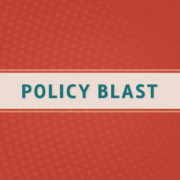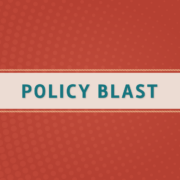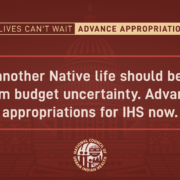Bipartisan Group of over Two Dozen Congressional Leaders Request Stable Funding for the Indian Health Service
On December 6, 2022, the House Native American Caucus sent a letter with 29 signatures from Members of Congress to the House Committee on Appropriations Chair Rosa DeLauro and Ranking Member Kay Granger on including advanced appropriations for IHS in the final Fiscal Year (FY) 2023 Appropriations bill. With the ultimate goal of mandatory funding, the letter urges the Biden Administration, the Indian Health Service (IHS), authorizing committees, and tribal nations to collaborate and work towards authorizing the shift away from discretionary funding.
The letter emphasizes that “all other federal government healthcare providers—Medicare, Medicaid, Children’s Health Insurance Program, TRICARE, and Veterans Health Administration—are all either under mandatory funding or receive advanced appropriations. IHS is the only major federal healthcare program that does not receive either and is up for annual appropriations,” and “[a]dvanced appropriations for FY24 will enable IHS to continue to provide health services without potential interruption, guaranteeing access to the necessary care for 2.6 million Native Americans and Alaska Natives.”
The outlined priorities include advance appropriations for FY24 to address the disruptions and chronic underfunding of IHS. Appropriate funding can help to avoid the current challenges including staffing shortages, limited equipment availability, and extended wait times. In addition, each Continuing Resolution (CR) requires hundreds of tribal and urban Indian organization (UIO) contracts to adjust for funding, affecting financial stability. Advanced appropriations give Indian health programs the ability to manage budgets, coordinate care, and improve health quality outcomes.
This letter sends a powerful and straightforward message to Chair DeLauro and Ranking Member Granger that in order to fulfill the federal government’s trust responsibility to all AI/ANs to provide safe and quality healthcare, funding for Indian health must be secure.
NCUIH is grateful for the support of the following Representatives:
- Rep. Tom Cole, Co-chair, Congressional Native American Caucus
- Rep. Sharice Davids, Co-chair, Congressional Native American Caucus
- Rep. Markwayne Mullin, Vice Chair, Congressional Native American Caucus
- Rep. Doug LaMalfa, Vice Chair, Congressional Native American Caucus
- Rep. Raúl M. Grijalva, Vice Chair, Congressional Native American Caucus
- Rep. Frank Pallone Jr., Vice Chair, Congressional Native American Caucus
- Rep. Betty McCollum, Vice Chair, Congressional Native American Caucus
- Rep. Mary Peltola
- Rep. Earl Blumenauer
- Rep. Darren Soto
- Rep. Adam Smith
- Rep. Tom O’Halleran
- Rep. Joe Neguse
- Rep. Daniel T. Kildee
- Rep. Dusty Johnson
- Rep. Jared Huffman
- Rep. Kurt Schrader
- Rep. Gwen Moore
- Rep. Doris Matsui
- Rep. Peter DeFazio
- Rep. Raul Ruiz
- Rep. Zoe Lofgren
- Del. Eleanor Holmes Norton
- Rep. Melanie Stansbury
- Rep. Shontel Brown
- Rep. Teresa Leger Fernández
- Rep. Tony Cárdenas
- Rep. Ruben Gallego
- Rep. Liz Cheney
Full Letter Text
Dear Chairwoman DeLauro and Ranking Member Granger,
In the Fiscal Year 2023 (FY23) President’s Budget, the President requested that the funding for the Indian Health Service (IHS) be shifted from discretionary to mandatory funding. This will ensure funding is secured for IHS and the millions of Native Americans and Alaska Natives it serves, regardless of a government shutdown and delayed appropriations. All other federal government healthcare providers—Medicare, Medicaid, Children’s Health Insurance Program, TRICARE, and Veterans Health Administration—are all either under mandatory funding or receive advanced appropriations. IHS is the only major federal healthcare program that does not receive either and is up for annual appropriations.
As members of the Congressional Native American Caucus, we encourage the Biden Administration, IHS, authorizing committees, and tribal nations to collaborate and work towards authorizing this shift to mandatory funding. While this process is underway, advanced appropriations for IHS should be included in the final FY23 Appropriations bill. The advanced appropriations for FY24 will enable IHS to continue to provide health services without potential interruption, guaranteeing access to the necessary care for 2.6 million Native Americans and Alaska Natives.
IHS has been chronically underfunded since its creation in 1955. According to a Government Accountability Office (GAO) Report, in 2017 per capita spending for IHS was $4,078 compared to $13,185 for Medicare. Due to these insufficient funds, IHS regularly experiences staffing shortages, limited equipment availability, extended wait times, and several other problems. Every time Congress passes a Continuing Resolution (CR), IHS must modify hundreds of tribal contracts to adjust for the available funding. This also takes an extensive toll on a tribe’s financial stability as higher interest on loans can occur when there is uncertainty of federal funding, leading to a downgrade in credit rating.
Advanced appropriations would allow Indian health programs to manage budgets, coordinate care, and improve health quality outcomes for Native Americans and Alaska Natives effectively and efficiently. This population suffers disproportionately from a variety of health afflictions including diabetes, heart disease, tuberculosis, and cancer. This change in the appropriations schedule will help the federal government meet its trust obligation to tribal governments and bring parity to federal health care systems. Health care services in particular require consistent and reliable funding to be effective.
Background on Mandatory Funding and Advance Appropriations for the Indian Health Service
The Indian health system, including IHS, Tribal facilities, and UIOs, is the only major federal provider of health care that is funded through annual appropriations. If IHS were to receive mandatory funding or, at the least, advance appropriations, it would not be subject to the harmful effects of government shutdowns and CRs as its funding for the next year would already be in place. This is needed as lapses in federal funding put lives at risk. Without funding certainty during government shutdowns can cause UIOs to reduce services, close their doors, or force them to leave their patients without adequate care. During the last government shutdown, UIOs reported at least 5 patient deaths and significant disruptions in patient services. Securing stable funding for IHS has been a major priority for Indian Country and NCUIH has taken part in extensive advocacy to ensure the continuation and delivery of health services to all Native people regardless of where they live.
There has also been strong long-standing support from Congress on this issue and legislation on this effort has been introduced in 11 bills since 2013. Currently, 107 current Members of Congress have expressed support for advance appropriations for the Indian Health Service since the first bill was introduced by the late Representative Don Young (R-AK-At Large; H.R. 3229) and Senator Lisa Murkowski (R-AK; S. 1570). Congress has sent letters in the past advocating on this issue:
- January 12, 2022 – Native American Caucus sent letters to the House Appropriations Committee Chair DeLauro and Ranking Member Granger requesting that advance appropriations for IHS for FY 2023 be included in the final FY 2022 appropriations bill on January 12, 2022.
- April 25, 2022 – Bipartisan group of 28 Representatives requestedup to $949.9 million for urban Indian health in FY 2023 and advance appropriations for IHS until such time that authorizers move IHS to mandatory spending, and 12 Senators sent a letter with the same requests.
- June 3, 2022 – Native American Caucus sent another letterencouraging the Committee to work towards shifting IHS from discretionary to mandatory funding and requesting that, while this shift is underway, the Committee include advanced appropriations for IHS in the final FY 2023 Appropriations bill.
Resources on Advance Appropriations for IHS:
- NCUIH Timeline of Advocacy and History of Advance Appropriations for the Indian Health Service
- NCUIH Advance Appropriations for the Indian Health Service Infographic
- NCUIH Resolution Advance Appropriations
- NIHB Resolution on Advance Appropriations
- NCAI Resolution on Advance Appropriations
- USET Resolution on Advance Appropriations
Next Steps
Congress has until December 16, 2022, to pass a longer-term spending package for FY 2023. In the meantime, NCUIH will continue to advocate for advance appropriations in the final FY 2023 omnibus.











Leave a Reply
Want to join the discussion?Feel free to contribute!